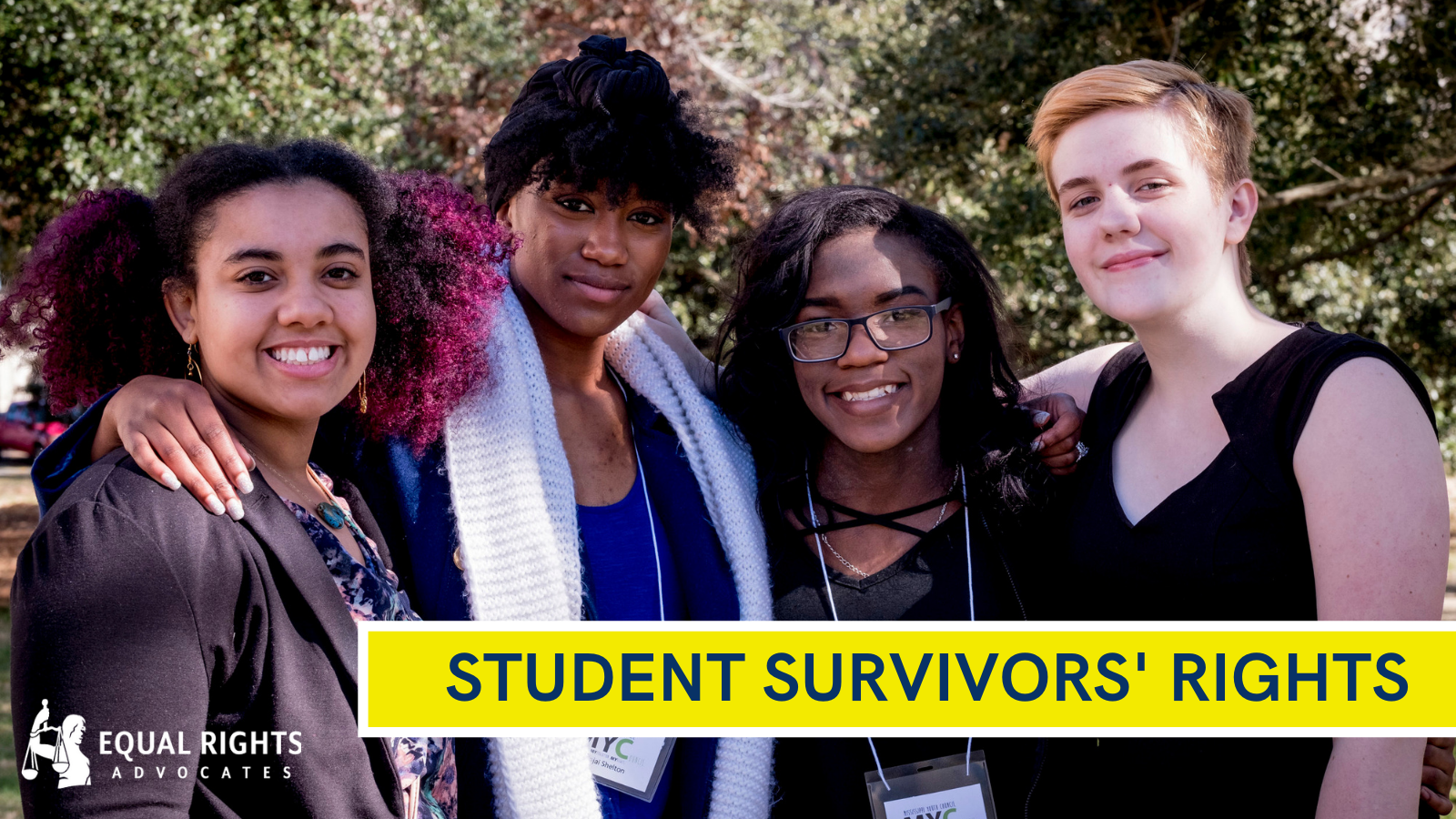New brief tears down U.C.’s ‘best to keep survivors in the dark’ argument
October 1. 2021
For Immediate Release
Oct 1, 2021
Media Contact
Nazirah Ahmad
[email protected]

Our appeal challenges court’s failure to include survivors in cases regarding their own sexual assaults
* Pseudonym used to protect the survivor’s identity.
On Sept. 30, 2021, Equal Rights Advocates filed a reply brief in our appeal on behalf of Jane Roe,* a survivor of college sexual assault whose Title IX case was reopened and heard by a California court without her knowledge or involvement. (Doe v. U.C. Regents)
Our appeal, filed on April 15 in partnership with Public Counsel and Steptoe & Johnson LLP, challenges a California Superior Court’s decision to overturn a years-old U.C. Santa Barbara sexual misconduct finding after the case had closed. The court case, filed by the assailant, proceeded for over a year without the survivor’s knowledge, with both the court and the University failing to notify the survivor, let alone giving her the chance to defend herself or correct inaccuracies in the assailant’s description of the incident.
Our new brief addresses the University’s condescending argument for why survivors should be kept in the dark about court cases filed by their assailants: that it’s better for survivors because knowing they later might be “embroiled in lawsuit[s]” about their sexual assaults would keep some from reporting sexual violence or seeking safety and support through Title IX. Our brief also addresses the assailant’s argument that survivors have “no substantial interest” in court cases related to their sexual assaults.
“Survivors who prevail in their campus Title IX proceedings have a right to participate in court cases seeking to overturn those outcomes.” – Brenda Adams, ERA Senior Counsel
The outcome of the appeal will determine whether California student survivors who file campus sexual misconduct complaints must be notified about and given the opportunity to participate in subsequent court proceedings filed by their assailant. If superior court cases filed by assailants are allowed to proceed without involving or even notifying the survivor, California courts could continue to weigh only the interests of the accused against those of the university. Such judicial precedent is discriminatory, blatantly harmful to survivors, and undermines the validity and purpose of Title IX on campuses.
In its brief, the University stated it is “not aware of any writ petition brought by a student sanctioned for sexual assault in which the complainant [survivor] was [notified and allowed to participate].” But more than 600 similar cases have been filed against schools nationwide by Title IX respondents since 2013, asking courts to throw out schools’ findings of sexual assault. California has the highest percentage of these cases filed (18%), and the rising tide of litigation challenging schools’ Title IX findings is profoundly influencing California campus sexual misconduct adjudication procedures, resulting in lopsided procedures that unfairly favor the accused. This appeal seeks to change that and give a voice to survivors in these proceedings.
Background
Trigger warning: sexual assault, institutional betrayal
When Jane Roe* was raped by a fellow U.C. Santa Barbara student in 2015, she used her school’s Title IX process to help her feel safe on campus afterward. The school’s thorough investigation resulted in the assailant being suspended for three years — enough time for Jane to graduate before he returned to school.
But in 2019, more than a year after Jane graduated, she was blindsided with the news that her assailant had taken the case to a California Superior Court two years prior without her knowledge. For over a year, the court received testimony and evidence about Jane’s sexual assault and Title IX complaint without even notifying her, let alone hearing her account of the incident or considering arguments in her favor. Unsurprisingly, the Court decided in favor of the assailant (John Doe*), ordering U.C. Santa Barbara to throw out its original finding of sexual assault and potentially re-open the case.
Beginning a new a school-conducted investigation would not allow for an accurate or fair result because, like Jane,* most of the witnesses graduated years ago, and the Title IX investigator is no longer employed by the school. Additionally, new school policies responding to Trump-era Title IX regulations and new state requirements would subject Jane to a cross-examination about the sexual assault, re-opening a wound she thought had closed years ago.
Jane Roe,* and we her representatives, are hopeful the Court will affirm survivors’ rights to advocate for themselves and fully participate in any court proceedings reviewing the outcomes of their own sexual assault complaints.
Brenda Adams, ERA Senior Counsel for Education Equity and Litigation, who is leading our work on the case, said: “While this unfair and discriminatory practice has gone on for years, thankfully the law is clear: survivors who prevail in their campus Title IX proceedings have a right to participate in court cases seeking to overturn those outcomes.”
Stay Connected & Take Action
- Get the Latest News & Information Sign up for Email Updates
- Sign Up for Action Alerts Join the Action Team
- Follow Us
